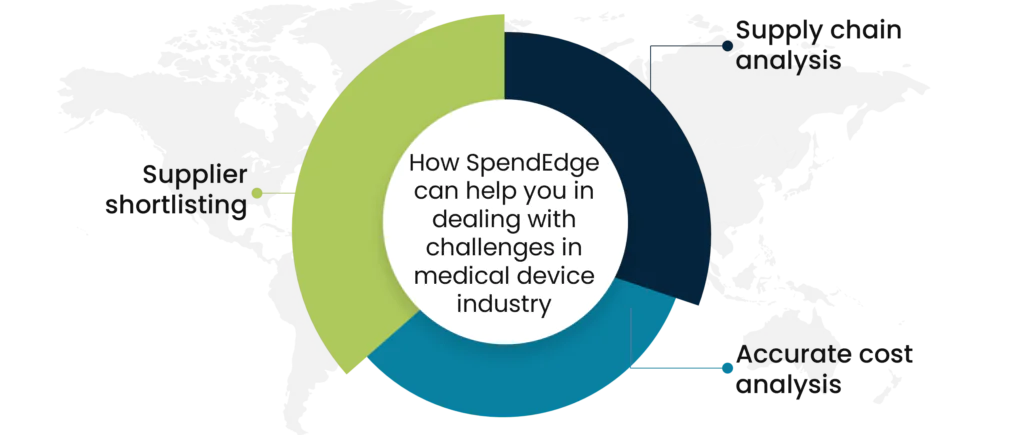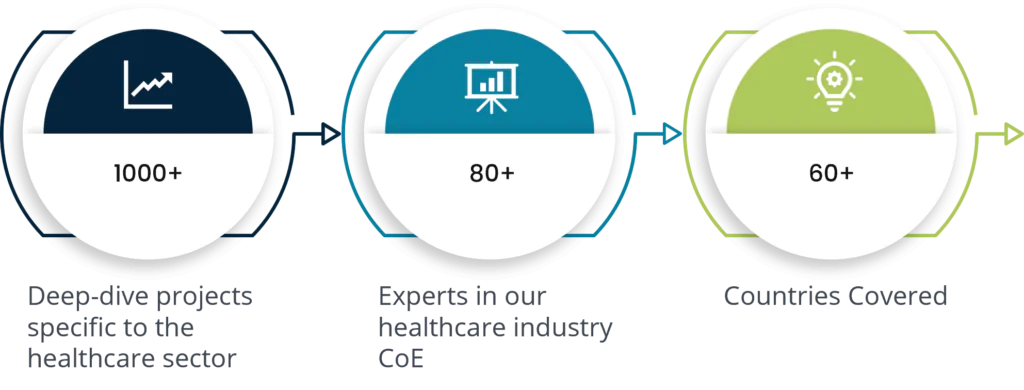By: George Mathew
The supply chain for medical devices is intricate and scattered. It is extremely vulnerable to various problems, which poses a challenge the healthcare sector. One of the biggest challenges in the supply chain of medical devices is achieving cost efficiency. To ensure smooth procurement activity, a lean supply chain is highly demanded. One of the major obstacles that arise is poor visibility into the supply chain functions, along with complicated logistics. Healthcare companies prioritize the quality of medical equipment as it is a major concern for them as they cannot compromise the lives of their patients, which ultimately depends on the proper functioning of these devices.
Top 3 challenges for medical device industry supply chain
Lack of supply chain resiliency:
During the procurement of medical devices, one significant challenge that arises is the lack of a resilient supply chain. Suppliers are responsible for the smooth functioning of the supply chain. The prompt delivery of goods, especially during vulnerable market conditions, depends on the suppliers’ dedication. Healthcare facilities should prioritize finding a trustworthy and dependable supplier who consistently delivers on their promised quality and ensures timely deliveries, even during unpredictable market conditions. It is important for the company to monitor the activities of its suppliers on a regular basis to identify and resolve any potential disruptions.
Lack of end-to-end traceability of the supply chain:
It is essential to trace the supply chain to identify potential risks in the process. However, this has proved to be a challenge for the healthcare industry due to insufficient resources to undertake such activities. It’s crucial to monitor every segment of the supply chain to address any deviations before they negatively impact operations. To minimize the impact of supply chain turbulence, it is essential to have a thorough understanding of the product’s origin and supply route and the severity of disruptions. This knowledge is required to effectively address the issue. Having a better grip on per-unit supply chain costs is necessary to control the overall procurement expense.
Rising input costs:
Healthcare facilities are facing concerns regarding rising input costs and increased competition. This can be attributed to the trend of inflation in prices. To address this issue, the healthcare industry must possess a complete understanding of the changing market prices and identify the manufacturers who offer these actual costs involved. By doing so, they can effectively tackle the challenges arising from rising input costs and increased competition. Medical facilities need to have visibility of inventory moving along the supply chain to determine the most efficient routes to reduce costs and increase speed to market.
How SpendEdge can help you in dealing with challenges in medical device industry

Supplier shortlisting:
To ensure smooth functioning of healthcare facilities’ operations, it is important that suppliers deliver devices on time, even during periods of market vulnerability. We assist you in finding the right supplier by determining your business objectives and carefully analyzing the pool of potential suppliers available. We will simplify your search by focusing only on those suppliers who can meet all your requirements, including those who can handle market fluctuations. Stay informed about the latest supplier market trends with our help. Our analysis allows you to categorize suppliers into quadrants based on their operational and functional capabilities. From there, you can rank them to determine the best fit based on your needs.
Supply chain analysis:
Stay ahead of supply chain uncertainties and gain valuable insights with real-time risk notifications. Our platform allows you to trace and track supply-side vulnerabilities using origin and transit data and optimize your supply chain through continuous KPI improvements. Identify and address supply risk factors at a category level and create data-centric backup plans for critical supply chain activities. By prioritizing sustainability, you can boost your brand reputation and achieve higher sustainability scores. You can use our risk scores to their utmost capability to frame supply chain decisions.
Accurate cost analysis:
Our cost models allow you to examine every cost component, which will help you improve your budget forecasting and planning. Additionally, it will enable you to manage price volatility risks efficiently. By predicting the impact of price volatility, you can respond to risk scenarios quickly and effectively. Our analysis of the true cost of medical devices will aid you in strengthening negotiations with suppliers. With complete visibility of device cost break up, you can identify the best suppliers for long-term engagements and avoid price hedging by knowing future price trends of components/services.
Success Stories: How SpendEdge helped healthcare facility enhance procurement function
The medical device supply chain deals with several risk factors, and to tackle this the healthcare industry must employ strategic measures. The supply chain risks are mostly due to the lack of visibility and traceability.
A Medical facility that was facing similar issues reached out to the experts at SpendEdge as they were seeking services that could help improve their supply chain’s resilience, while also enabling them to monitor potential risks on a regular basis. Another major concern for them was the increasing input costs.
We were able to assist the client in selecting the most suitable supplier with the ability to withstand unpredictable market conditions. This resolved their previous issue of an unreliable supply chain. Further, our analysis of market trends and supply chain risks enabled the company to monitor and address any potential risks in a timely manner. By using our cost models, they were able to determine the actual cost of certain critical medical devices and instruments and engage with suppliers that offered products at similar prices.
The company successfully achieved an efficient and effective procurement process without any disruptions in the supply chain.

If you are facing any of these or similar issues contact us now!
Author’s Details
George Mathew
Associate Vice President, Sourcing and Procurement Intelligence
George is a procurement specialist at Infiniti Research and provides advisory services to clients across the pharmaceutical, CPG & FMCG, energy, and automotive sectors. He specializes in the procurement areas of industry benchmarking, cost modeling, rate card benchmarking, negotiation advisory, and supplier intelligence.




